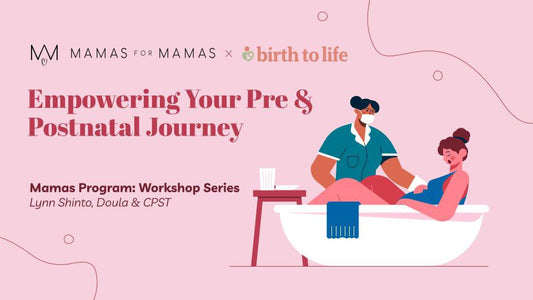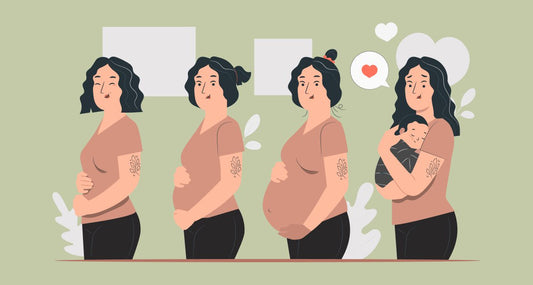Unconventional Postpartum Traditions Around the World

The postpartum period is a critical time for new mothers worldwide, with various cultures offering unique traditions to support recovery and bonding. While postpartum care universally acknowledges the need for rest and nurturing, the specifics can differ dramatically. In this blog post, we'll explore some fascinating and unconventional postpartum traditions from around the globe, highlighting how different cultures navigate this transformative time.

The Chinese Zuo Yuezi Tradition
Among the myriad of fascinating postpartum traditions worldwide, the Chinese Zuo Yuezi practice stands out for its meticulous attention to the emotional, physical, and nutritional needs of new mothers. Literally translated to "sitting the month," Zuo Yuezi mandates that mothers stay indoors for a full month following childbirth. This ancient practice, dating back over 2,000 years, aims to guide new mothers through a transformative period of postpartum recovery by offering vital postpartum care and support. And guess what? It involves more than just eating soup and binge-watching historical dramas, although that might sound tempting.
According to Chinese medicine, childbirth is a depleting experience that leaves new mothers susceptible to 'yin'—or cold—thereby requiring a regimen designed to restore 'yang'—warmth. This practice recommends wearing warm clothing, avoiding cold foods, and even steering clear of vigorous postpartum exercise. Think of it as a month-long spa retreat, but you’re also your spa therapist. A little ironic, isn't it?
Key aspects of this tradition focus on a specialized postpartum diet rich in 'warming' foods like chicken, ginger, and soups, to replenish energy and boost postpartum health. But it comes with a twist—some mothers avoid washing their hair to prevent catching a cold during this vulnerable period.
While some modern families adapt the practices to suit their current lifestyle, they maintain the essence of this tradition by emphasizing postpartum rest and nurturing. A study published in the Journal of Transcultural Nursing found that adherence to Zuo Yuezi significantly enhanced postpartum mental health and reduced symptoms of postpartum depression and anxiety (Cheung, 1997). No wonder this practice persists in modern societies.
Concluding with a sprinkle of humor from an enthusiastic new mom following the Zuo Yuezi, “If staying inside and being pampered for a month is an ancient tradition, count me in for as many lifetimes as possible!” Indeed, the Zuo Yuezi tradition offers more than just rest—it promises a holistic approach to postpartum recovery that honors the profound biological and emotional journey of welcoming a new life. For anyone intrigued by this ancient practice or looking for postpartum support, considering the professional guidance of a postpartum doula might be the modern twist that fits your unique needs.

The Indian Practice of Japa
In India, the postpartum period is often a time of deep-rooted traditions and cultural significance, vividly encapsulated in the practice known as "Japa." This tradition, extending for a period of 40 days after childbirth, is a unique blend of rest, recuperation, and ceremonial care that offers new mothers extensive postpartum support. The term "Japa" essentially translates to "prayer" or "chanting" in Sanskrit, which illustrates the sacred and nurturing approach taken towards the postpartum stage in Indian culture. Similar to the concept of a "babymoon," this practice allows the mother to focus entirely on healing and bonding with her newborn. During Japa, the new mother is relieved of all household duties and supported by family members, usually her mother or mother-in-law, and sometimes assisted by a traditional postpartum doula. This period is not just a gesture of kindness but an essential component of postpartum care designed to address postpartum fatigue, hormonal changes, and even postpartum depression. According to the Institute for Health Metrics and Evaluation, India has made significant strides in maternal health, reducing maternal mortality rates by a staggering 77% from 1990 to 2015. Such traditions internalize a community-centric approach that undoubtedly plays a role in this progress.
- Diet and Nutrition: The postpartum diet during Japa is precisely curated to enhance recovery and lactation, with meals rich in ghee, lentils, and herbal infusions. Think of it as a Michelin star treatment focused entirely on revitalizing the postpartum body.
- Massage and Oils: Regular oil massages are integral, promoting circulation and relieving postpartum joint and back pain, which can otherwise become uninvited guests overstaying their welcome on your postpartum journey.
- Rest and Relaxation: Adequate sleep and relaxation are prioritized, as any new parent will know, sleep can feel like an elusive unicorn in this stage.
Moreover, the social fabric that Japa weaves plays a crucial role in the mental health and emotional well-being of mothers. Studies, such as those published by the Harvard Review of Psychiatry, highlight the inverse relationship between social support and postpartum depression and anxiety symptoms. In Japa, the essence of community manifests in tangible support, ultimately nurturing not just the new life but the creator of that life—ensuring a holistic embrace for both the mother and child. Incorporating some light-hearted fun, one may jest that while a social media break can feel refreshing, a break with zero household chores and gourmet home-cooked meals takes relaxation to a whole new level. This cherished custom underscores the importance of re-evaluating how postpartum recovery can benefit from a sprinkle of traditional wisdom and round-the-clock care.

The Nigerian Omugwo Ritual
When we think of postpartum traditions, the Nigerian Omugwo ritual brings an interesting flair to the table. Omugwo is a cherished Igbo custom in Nigeria that highlights the importance of postpartum care and community involvement. Literally translating to "baby care," it is a practice steeped in wisdom, caring, and a whole lot of family love—because who doesn't need a battalion of aunties at their beck and call right after giving birth? In this tradition, the new mother's own mother or mother-in-law, with the support of other female relatives, becomes the anchor in the household for at least 40 days postpartum. This period allows the new mom to focus on healing and bonding with her newborn, while the seasoned hands take charge of housekeeping chores and educate the new parents on infant care.
Fun fact: In 2019, UNICEF highlighted that Nigeria has one of the highest birth rates in the world, with approximately 39.4 births per 1,000 people. This makes Nigeria a fertile ground—pun intended—for exploring unique postpartum practices (UNICEF).
Omugwo offers more than just physical support—it is also a foundation for postpartum mental health. Research shows that postpartum depression affects 10-15% of new mothers worldwide, and Omugwo can play a crucial role in mitigating these symptoms by alleviating stress and providing a robust support system (WHO).
Of course, Omugwo isn't just about herbal baths and balanced postpartum diets made with love—though who could turn down a hot bowl of pepper soup specially prepared to boost the immune system? It extends to postpartum bonding, where grandmothers impart timeless wisdom and parenting tips to help the new generation navigate the rollercoaster of postpartum life.
For those feeling postpartum fatigue or postpartum blues, the Omugwo ritual offers a comforting balm in the form of not just physical assistance but also emotional camaraderie. As a Nigerian proverb aptly puts it, "It takes a whole village to raise a child." In the case of Omugwo, it certainly takes a village to care for the postpartum body and soul, making it a truly exceptional tradition worth acknowledging and possibly even adopting in spirit.

Japanese Satogaeri Bunben Custom
In the realm of postpartum traditions, Japan offers a beautifully nurturing practice known as the Satogaeri Bunben. Quite literally translating to "home return childbirth," this custom is steeped in deep-rooted cultural values of family and community support, extending postpartum care far beyond the modern clinical approach. So, what does this tradition entail, and why does it matter in today's increasingly individualistic world? Let's dive in.
In the Japanese Satogaeri Bunben tradition, new mothers often return to their own family's home—usually the maternal household—to give birth and recover. For about a month or more postpartum, the young mothers remain there, surrounded by the loving care of their own mothers and family members. This period, often called the "Sango," is akin to a personalized recuperation retreat, focusing on postpartum recovery and wellness.
But don’t be fooled; this isn't just about a couple of Netflix marathons with Mom. The Satogaeri Bunben is backed by an incredibly supportive framework, emphasizing the importance of postpartum nutrition and postpartum rest. Imagine platters of nourishing soups and freshly prepared foods rich in essential postpartum vitamins, energetically nurturing your body back to strength. After all, those postpartum hormones are no joke! One might say it's the royal treatment every new mom deserves but seldom gets in today's hustle culture.
In a humorous twist, while some cultures laud postpartum diets as a path to postpartum weight loss, the Japanese focus on food to fortify—not slim down. It's almost as if they say: why rush to fit into those pre-pregnancy jeans when you can enjoy a lovingly prepared bowl of miso soup?
Family jokes and laughter abound as the new mother is encouraged to sidestep postpartum anxiety or postpartum blues, indulging instead in family camaraderie. It's a time to revive family traditions, maybe even learn how to craft that intricate origami swan from Grandma.
The impact of Satogaeri Bunben extends beyond pampering the mother; it plays a crucial role in preventing postpartum depression by creating a strong support network. Studies have shown that social support is instrumental in reducing the risk of postpartum mood swings and stress-related disorders (source). Therefore, a multi-generational gathering not only enriches family bonds but also serves vital postpartum mental health benefits.
While every practice has its unique quirks, the Japanese Satogaeri Bunben custom shines as a testament to how important community can be in a mother’s postpartum journey. It begs the question: how might our own postpartum body and soul feel if we, too, were enveloped in such focused familial care?

The Dutch Kraamzorg System
The Dutch know how to pamper a new mother, and it's called the "Kraamzorg" system. If you're imagining Dutch doulas on bicycles, gracefully pedaling through tulip fields to deliver postpartum care, you're not far off! This unique tradition offers an all-encompassing approach to postpartum recovery, making it one of the most admired systems globally. Kraamzorg ensures that mothers receive professional in-home care for the first week after childbirth. It's essentially like having a personal postpartum doula on speed dial, minus the need for dial-up internet. According to the Dutch Ministry of Health, Welfare and Sport, about 98% of families opt for this service (CBC News).
Here's what typically happens during Kraamzorg:
- Daily Check-ins: A trained "kraamverzorgster" checks on both mother and baby, ensuring that any postpartum symptoms like bleeding or fatigue are managed effectively.
- Parental Education: New parents receive guidance on newborn care, breastfeeding, and even insights into postpartum hormones to help curb any unexpected mood swings.
- Household Assistance: From preparing nutritious meals that support postpartum recovery to tidying up the nursery, your kraamverzorgster has got your back—literally, if you're dealing with postpartum back pain!
- Emotional Support: Mental health is as essential as physical health. This system places a strong emphasis on postpartum mental health to mitigate postpartum depression and anxiety.
- Family Inclusion: The entire family is encouraged to get involved, fostering a supportive environment which is crucial for postpartum emotional healing.
One parent shared, "Our kraamverzorgster was a lifeline during those foggy new parent days. Having someone who understands postpartum essentials and guides you through postpartum nutritive care is truly priceless." With such comprehensive care at their doorstep, it’s no wonder that Dutch moms seem to emerge from the postpartum period with the same glowing radiance that their country is known for.

The Malaysian Berpantang Tradition
Welcoming a new life into the world is an extraordinary event, and the postpartum journey that follows is equally significant. In Malaysia, this transition is accompanied by the age-old tradition known as "Berpantang." While it might sound like a name for a tropical drink, Berpantang is a meticulous postpartum care regimen aimed at nurturing the mother's recovery and well-being. Predominantly practiced by the Malay community, it spans a typical duration of 44 days, though you're not banned from chocolate permanently (thankfully!).
Central to the Berpantang tradition is the emphasis on warmth. New mothers are encouraged to avoid cold elements—including food, water, and the weather—a practice believed to aid in balancing postpartum hormones and soothing postpartum fatigue. Imagine stepping into a steamy, healing sauna that eases postpartum back pain without any judgment on your current binge-watching habits of reality shows; that's Berpantang for you!
Diet plays a crucial role, where mothers consume a "panas" (warm) menu, featuring foods believed to support speedy postpartum recovery. Often included are nutrient-rich items like turmeric, ginger, and black pepper. They don't just spice up postpartum meals but are also shown to support postpartum health, according to a study published in the Journal of Inflammation Research. For those thinking about postpartum weight loss, you're in luck—ginger, a common Berpantang staple, is known for enhancing metabolism.
Besides the culinary delights, postpartum abdominal care is another highlight. The use of a "bengkung" or postpartum girdle helps in providing support to the postpartum body, promoting posture correction, and enhancing postpartum healing. The act of binding, coupled with massages, aims to tackle postpartum stretch marks, alleviate postpartum cesarean care, and bid adieu to postpartum urinary incontinence for good measure. This isn’t just a tradition but a comprehensive roadmap to postpartum wellness.
One cannot discuss Berpantang without mentioning the communal aspect. Family, often grandmothers and mothers-in-law, play an indispensable role in providing postpartum support, ensuring that the mother feels enveloped by a loving cocoon. After all, “It takes a village,” as the old adage goes, especially when you add midnight diaper changes to the mix!
So, while the Berpantang tradition might initially appear strict to outsiders, it's a loving embrace of support that holistically prioritizes postpartum care and recovery. Whether it’s battling postpartum mood swings with warmth or celebrating the imperfections of postpartum skincare, these practices embody the holistic essence of maternal care across cultures.

Embracing Cultural Diversity
As we wrap up our journey through unconventional postpartum traditions worldwide, it's evident that cultural diversity plays a significant role in shaping postpartum care. From the exquisite custom of "zuo yuezi" in China, where new mothers enjoy a month of rest enveloped in nourishing meals, to the heartwarming Maasai tradition in Africa where the community collectively supports new parents, these practices highlight the universal acknowledgment of postpartum recovery's importance. While these might differ in approach, the underlying compassion and support resonate globally. Remember, adopting a postpartum tradition that suits you can aid in easing postpartum symptoms like fatigue and anxiety. A splash of humor, like comparing postpartum exercise to assembling IKEA furniture—both daunting but rewarding—might just add a new perspective to your recovery journey. Parenthood Times emphasizes that nurturing postpartum mental health by integrating supportive traditions can provide significant benefits to overall well-being. As you embark on this beautiful chaos called parenthood, take inspiration from around the globe and craft your unique postpartum path. Whether it's belly binding or indulging in postpartum vitamins, it's your recovery, your way. Ultimately, postpartum care is less about perfection and more about progress. So, choose your traditions wisely and remember, you're not just healing your body, but nurturing a new chapter of life. Happy healing!







0 comments